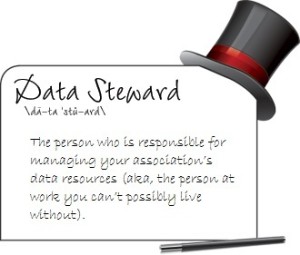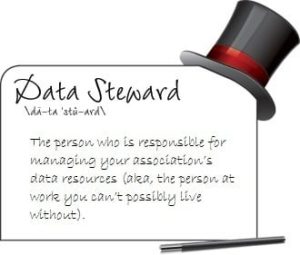Among the questions we’re asked when implementing a new business intelligence initiative is to describe the role and duties of the data steward. As part of the planning process, we work with leadership and staff to ensure that at least one person (and sometimes several) within the association is identified as having the function of data stewardship. This is a key role within the ecosystem of an association and is essential to ensure the organization successfully leverages and maintains the integrity of their data.
The duties of the data steward include:
- management of the association’s data assets to ensure users are provided with accurate data
- coordination between the IT department and the business side regarding data usage and security policies
- responsibility for tracking the movement of data inside an organization (how data is entered into systems – manually by staff, online by customers, data imports, etc.)
- both prevention and correction of data quality issues by working with internal staff to create standard operating procedures (SOPs) and policies for the use and creation of data
Business intelligence initiatives are often more of a process and policy shift in an organization rather than a technology implementation. Learning to treat your data as an asset is one of the main organizational shifts in thinking required for sustained success of your BI initiative. The data steward should have the ability and authority to ensure the overall quality and consistency of an association’s data so that it can be used to draw accurate conclusions by the association. This person is not typically a technical person in IT, but rather someone who is familiar with the association’s data, its business rules and the ways by which data is created.
As the growth of available data continues to increase exponentially, the demand for those charged with the management and coordination of all aspects affecting the validity of that data is also increasing. Data Stewards are in great demand across industries. Some associations have created formal data steward positions filled by staff drawn from roles in the association where they already have a strong understanding of their data. Other associations assign stewardship responsibilities to employees who have other duties as well. Although at the beginning it may be sufficient to add data steward responsibilities to one or various staff with existing duties, associations that are truly committed to using their data as an asset should formalize the role. Absent this dedicated role, what often occurs is a lack of accountability and authority that impairs the ability for leadership to trust the analytics that are based on the data. No amount of organization or visualization of data will overcome the obstacle that is improperly maintained data. Formalizing the position will ensure that data stewardship is given the significance it needs in order to be successful.
Regardless of how the position is structured, an effective data steward ensures that established data management policies are adhered to, and all processes surrounding the data throughout its lifecycle in the association are effectively carried out in order to maintain its integrity. One of the reasons we hear associations give for being skeptical about the potential for BI is that they do not trust the data they have. It may be due to the lack of controls in place while collecting it, the manipulation of the data as it moves through the various areas in the association, or simply because the data is not current. Just as you would evaluate your stock portfolio as an investor, a continued process of oversight and management of the data in an association’s possession is critical to maintaining its value.
As associations increase their efforts to manage and maintain their internal information, decisions about data quality standards and surrounding processes must be deliberate. Leadership must be willing to enforce consistency and accuracy, and to invest in skills that support the systems and business initiatives they are undertaking. Establishing and filling the role of data steward will increase the focus that an association has on the data it creates and manages, and in the use of that data for accurate decision-making. This role is the hallmark of a data-driven culture that is guided by human insight and highlights the importance of managing data as a crucial asset.




